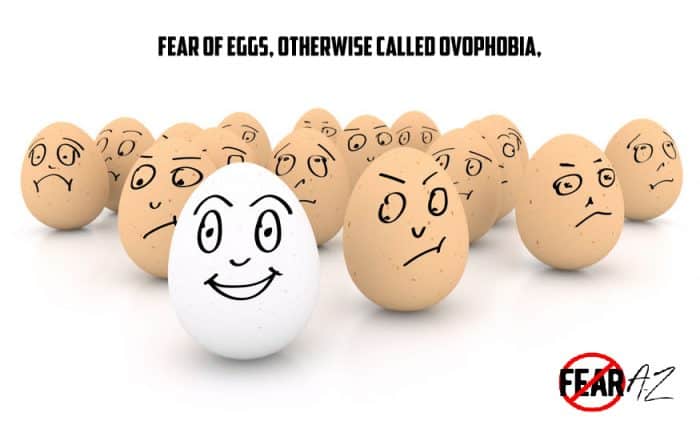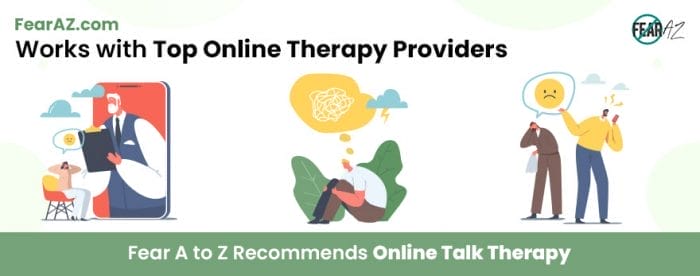Share This Article
Fear of Eggs- A Real Phobia?
Ovophobia or also known as the Fear of Eggs is a real phobia and it causes real issues, let’s crack on and discus in depth.
Fear of eggs, otherwise called ovophobia, isn’t a common phobia. Many of those affected usually have had a traumatic experience involving eggs. Phobic persons aren’t born with their fear. They learn it because of experiences during their younger years or perhaps in rare occasions as adults.
Often, people suffering from the phobia do not recall how the excessive fear began. They cannot pinpoint the time the phobia manifested they just recall experiencing fear symptoms. In many cases, the fear simply persists or increase with age.
Is Ovophobia a Phobia of Fear or Disgust?
Eggs alone pose no danger or threat but those of you with this phobia may have an unreasonable and overwhelming dislike of eggs which provokes avoidance and anxiety. Unlike the temporary anxiety you might feel when taking a test or giving a speech, a fear of eating eggs may be lasting and affects a person in social settings, at work, or school. Individuals with this phobia experience intense, constant fear that is disproportionate to the actual risk.
Some phobia sufferers may also have a deep-rooted disgust for eggs, this disgust can lead to fear as you try to avoid contact with eggs. This fear is not weird, so try to get past the stigma, eggs are simply an item that you are afraid of. With simple techniques and educating yourself, you can limit this fear greatly.
Thankfully, there’s hope for those who have this phobia. The best approach involves exposing the person to situations and places that elicit anxiety. By taking small steps daily, sufferers ultimately learn to cope with situations that previously generated intense fear, this is known as Exposure or Desensitization Therapy and is better explained below.

Ovophobia Meaning?
This is your brain on Ovophobia: if only there was a tv commercial explaining this excessive fear, well we will try.
This term denotes fear-of-eggs phobia triggered because of negative experiences involving eggs. Such experiences include being hit by eggs, breaking eggs accidentally, and smelling eggs (a disgust of eggs). A trigger might also emerge because of egg allergies – a fear of becoming ill due to eggs. Some sufferers might even think that living creatures such as chickens might pop out of an egg, thus some have the fear of cracking eggs.
Like all kinds of phobias, the why isn’t as significant as the how. Rather than determining why or where the fear originated, it’s crucial to recognize how the mind develops fear. This is more significant for considering the right treatment approach.
A person might exhibit indications of anxiety upon seeing an egg. A glance at an egg makes some physically ill and might even faint. Others even fear going to cafes and restaurants. They experience an instant feeling of intense anxiety, disgust and panic when thinking about or being exposed to the source of their fear.
While they recognize that their fears are unreasonable, they feel a sense of powerlessness. They’ll also do everything possible to avoid the situation or object or endure it with intense fear or anxiety. This is where social problems may occur, not going to restaurants, events or visiting friends because of the fear.
What Causes Ovophobia?
Doctors are uncertain about the precise causes, and many with the phobia can’t remember when, how, or why the fear developed. Many can’t even associate their fear with a particular experience. They’re simply fearful. In this instance, temperament, traits, and other inherited elements might be responsible. However, these are possible causes:
Negative Experience
This fear stems mostly from a negative experience even if a person can’t recall the experience. For instance, a person might have had a traumatic experience in their childhood and forgot about it.
Environment and Genetics
Young children usually learn numerous behaviors from their environment and parents, including those associated with anxiety and fear. For instance, if your parents felt nervous around eggs, you might have picked up on the behavior in your younger years and developed a comparable response.
Ovophobia Symptoms
Persons with this phobia frequently experience panic attacks, which can be distressing and frightening. The signs frequently occur abruptly and without warning. Symptoms differ from person to person. For some, the phobia might cause mild discomfort. For others, it involves debilitating attacks. Besides overwhelming anxiety, a panic attack could cause these physical symptoms:
Physical Symptoms
- Trembling
- Sweating
- Difficulty breathing or shortness of breath
- Tightness or pain in the chest
- A choking feeling
- Nausea
- Dry mouth
- Dizziness and headaches
- Feeling faint
- Disorientation or confusion
Psychological Symptoms
- Fear of death
- Indications of anxiety upon seeing an egg
- Panic attacks
- Fear of powerlessness
- The person will go to great lengths to avoid contact with eggs
- Shame, guilt, or self-blame about fearing eggs
- Dread or panic at the sight or thought of chickens
- An overwhelming need to be away from eggs
Self-help: Coping with Ovophobia
Meditation Techniques
Various kinds of meditations can be beneficial for those who experience the fear of eggs. You’ll also find numerous meditation apps that help make things easy. Mindfulness can help sufferers because of how it distracts you from the fear by refocusing your attention on other things that don’t have any kind of emotional baggage attached.
If you find yourself in the middle of a panic attack, redirecting your attention to the different sensations experienced when breathing can help decrease the mental anguish.
In addition to concentrating on breathing, you can concentrate on the surrounding sounds, how your skin feels against certain objects, and how particular aromas smell. Honing into your senses can help you decrease some of the anxiety related to the phobia. Remember, this takes practice.

Exercise
Exercise has proven beneficial for those suffering from phobias, including ovophobia. In particular, cardiovascular exercise can help alleviate one’s stress considerably. That isn’t to say that weight-resistance training wouldn’t benefit someone with anxiety.
Rather, aerobic exercise has proven more efficient at emitting endorphins in the brain. Exercise can help condition your mind to cope with stressful circumstances better. If you lead a sedentary lifestyle, engaging in aerobic exercise might help decrease your symptoms by making it easier for you to cope with the stress and anxiety related to the condition.
Numerous aerobic modalities exist that can help decrease your symptoms, including biking, swimming, jogging, and walking. Alternatively, you could play sports, for instance, basketball or tennis.
Yoga
Numerous yoga poses can benefit sufferers considerably. This is partly because of the meditative mind state that yoga emits in people who practice it consistently. Yoga can help alleviate some of the anxiety related to this phobia because you’ll direct your attention to more productive things. Yes, simple getting your mind off of eggs will help.
If you’re new to yoga, consider taking a class or watching some videos that could help you through different poses. Similar to meditation, the more practice you do, the more skillful you’ll become. Besides helping you decrease phobia symptoms, you can expect to gain increased flexibility and strength.
Professional Help
Doctors recommend ovophobia treatment when the phobia disrupts your daily life. The most effective treatment approaches include:
Cognitive Behavioral Therapy
This approach teaches people how to recognize and alter unhealthy emotions, thoughts, and behaviors. The objective is to build confidence in the person and have them gain control over the fear. Therapists might adopt this approach together with exposure therapy.
Exposure or Desensitization Therapy
With this approach, the sufferer will undergo gradual and repeated exposure to eggs under controlled circumstances. For a severe phobia, this might just entail thinking about eggs. The use of anxiety-reducing methods will help the person face fear until they master it. Consequently, the person will come across more intense circumstances with eggs. The objective is to discover that it’s possible to control the fear rather than have it control you.
Talk Therapy
Talk therapy might be what is needed to help you overcome your phobia. Most therapists are qualified to tackle this phobia, and some specialize in phobia treatment.
End of the Line for Ovophobia
While ovophobia might seem unrealistic to most people, those who suffer from it know how debilitating it can be. Fortunately, there’s hope for those who want to overcome their fear.
Similar Phobias: Fear of Pumpkins, Fear of Bananas




